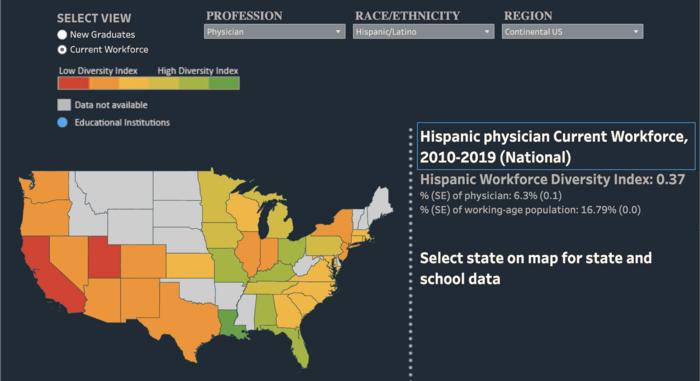WASHINGTON (July 5, 2023)–Although the situation is improving, Latinos and especially Mexican Americans, remain very underrepresented in U.S. health professions that require advanced degrees, according to a study published today in the journal Health Affairs. The study by George Washington University researchers is the first to examine the representation of the four largest Latino populations in the U.S. health workforce and the findings raise concerns about the lack of diversity in the U.S. health workforce.

Credit: Fitzhugh Mullan Institute for Health Workforce Equity. Health Workforce Diversity Tracker. Washington, DC: George Washington University, 2021
WASHINGTON (July 5, 2023)–Although the situation is improving, Latinos and especially Mexican Americans, remain very underrepresented in U.S. health professions that require advanced degrees, according to a study published today in the journal Health Affairs. The study by George Washington University researchers is the first to examine the representation of the four largest Latino populations in the U.S. health workforce and the findings raise concerns about the lack of diversity in the U.S. health workforce.
The study revealed that Mexican Americans, despite being the largest Latino subpopulation in the United States, are greatly underrepresented in the health professions that require an advanced degree. One out of ten people in the United States are Mexican American yet in five of the eight professions requiring advanced education included in the study, Mexican Americans represent one-quarter or less of the professions. This study suggests they and other Latinos in the study face many barriers to occupations in the healthcare field that require an advanced degree such as doctor, nurse or pharmacist.
“Our analysis did not address why Latino representation was low in the health professions requiring advanced degrees,” Indira Islas, who conducted the study while a graduate student at the GW Milken Institute School of Public Health, said. “Other evidence suggests that the findings can be attributed to obstacles such as structural racism.”
Islas and her colleagues at the GW Fitzhugh Mullan Institute for Health Workforce Equity used data from the 2020 American Community Survey, which includes information on ethnicity collected by the Census Bureau. The team compared the representation of non-Latinos and four Latino subgroups, including Mexican Americans, Puerto Ricans, Cuban Americans and other Latinos.
The research showed a surprising finding for one subpopulation. Compared to other Latino groups, Cuban Americans are well-represented in the advanced degree health professions. For example their representation among physicians and dentists is greater than their numbers in the overall population.
The study also found that Mexican Americans, Puerto Ricans and other Latinos were overrepresented in most healthcare support occupations, low-wage jobs such as medical or dental assistants or home health aides.
Latino representation in the health workforce did show improvement during the time frame studied from 2016-2020: For example, Latino representation among recent graduates went from 6.7 to 13.5% for health professions requiring a bachelor’s degree. However, the researchers note that Latinos represented more than 21% of the population ages 20-35.
“There has been significant progress in getting more Latinos into the advanced health professions over the last few years,” Edward Salsberg, Co-Director of the Health Workforce Diversity Initiative at the Mullan Institute, said. “Yet as we can see from this study, much more needs to be done to strengthen and diversify the health workforce in the U.S. A lack of diversity among the health professions can exacerbate health disparities for Latinos and other minority populations.”
Islas, whose family came to the U.S. when she was a child, has experienced some of the obstacles to getting an advanced degree first hand.
Her parents, who were doctors in Mexico, had to find work in factory jobs when the family moved to the U.S. “I remember in high school we didn’t have a lot of resources,” Islas said. But Islas had a dream of becoming a doctor like her parents and she ended up getting a scholarship and went to college. In May of last year, she graduated from GW with a Masters of Public Health. She is now doing a fellowship with the Congressional Hispanic Caucus Institute with plans to apply to medical school in the fall.
The paper, Documenting Latino Representation in the U.S. Health Workforce, appears in the July issue of Health Affairs. The research was funded by the California Endowment and the Josiah Macy Foundation.
For additional data on Latino representation in the health professions including by state and by graduates of individual schools, visit: The Health Workforce Diversity Tracker.
-GW-
Journal
Health Affairs
Method of Research
Data/statistical analysis
Subject of Research
People
Article Title
Documenting Latino Representation in the U.S. Health Workforce
Article Publication Date
5-Jul-2023




